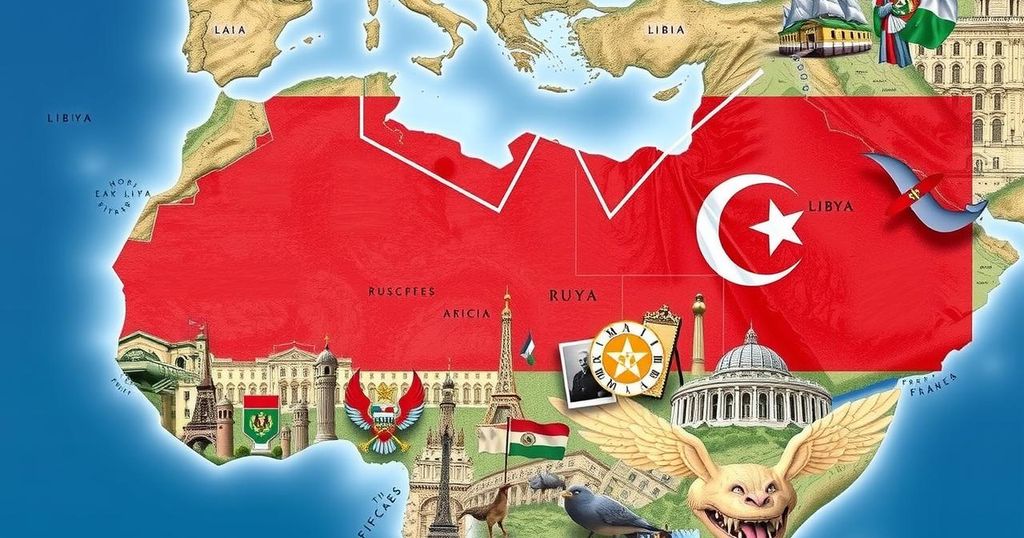Russia Shifts Focus to Libya Following Syria’s Political Upheaval

Following Bashar al-Assad’s downfall, Russia shifts its focus from Syria to Libya to maintain its geopolitical influence. Russia is actively supporting Khalifa Haftar, with notable military resource transfers to bolster its operations there. The transition poses challenges, as Libya’s political landscape is more fragmented compared to Syria, making Russian operations more complicated and visible.
The Kremlin’s changing geopolitical landscape has prompted a strategic shift towards Libya as Russia seeks to re-establish its influence following the upheaval in Syria. The downfall of Bashar al-Assad, a key Russian ally, has jeopardized Russia’s military foothold in the region, compelling Moscow to redirect attention to its operations in Libya, where it currently supports Khalifa Haftar. Russian involvement in Libya is marked by military resources and personnel being relocated from Syria, indicating a substantial commitment despite the complexities of Libyan politics compared to Syria’s relative obscurity.
Moscow operates a military port and an air base in Syria, which serve as operational hubs for its activities throughout the Mediterranean and Africa. Nonetheless, the abrupt change in Syrian leadership has initiated a recalibration of Russian strategies in the region. Following the appointment of Ahmed al-Sharaa as Syria’s new leader, who openly regarded Russia as an essential ally, the evolving situation nonetheless undermines Russia’s prior advantages.
In Libya, Russian mercenary groups are already positioned to assist Khalifa Haftar against the United Nations-recognized Government of National Unity (GNU). This scenario denotes a shift in Russia’s strategy not merely as replacing one ally with another but as an endeavor to maintain its influence across Africa. Reports suggest considerable military supplies have been dispatched from Belarus and Russia to bolster Haftar’s forces.
Archives indicate Russian operations at multiple strategic sites in Libya, with the transfer of advanced military equipment including anti-aircraft systems. Observers note that the Kremlin’s maneuvers in Libya intend to counterbalance Western influence while facilitating ongoing Russian missions across Africa. However, experts caution that the presence in Libya may not replicate the operational freedom enjoyed in Syria due to heightened scrutiny and the presence of competing interests, such as Turkey and Italy.
Additionally, Haftar’s dependency on Western support complicates Russia’s ability to integrate itself within Libya’s complicated political framework. In light of these challenges, it becomes clear that while Russia aspires to bolster its footprint in Libya, achieving comparable levels of influence akin to its engagement in Syria may prove exceedingly arduous.
Russia’s strategic presence in the Middle East and Africa has been traditionally anchored in its relationship with Syria, particularly under Bashar al-Assad’s regime. The stability provided by Assad allowed Russia to project power and manage its interests in the region without significant interference from Western nations. However, the recent political upheaval in Syria signifies a potential end to this arrangement, prompting Moscow to reevaluate its position and seek alternative bases of influence in Libya, a country with a fractured governance structure and ongoing conflicts that can be exploited for strategic gains.
In conclusion, the transition of Russian strategic focus from Syria to Libya underscores a significant shift in geopolitical maneuvers in response to changes in the Middle Eastern political landscape. While Libya offers a new venue for Russian ambitions in Africa, the complex political dynamics and existing rival interests may hinder Moscow’s operational strategies. Russia’s near-future endeavors in Libya will require careful navigation of the local and global geopolitical environment, reflecting a need for multifaceted strategies in pursuit of continued influence.
Original Source: thedefensepost.com






